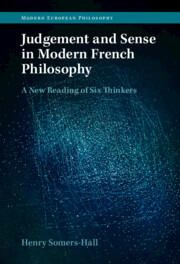Book contents
- Judgement and Sense in Modern French Philosophy
- Modern European Philosophy
- Judgement and Sense in Modern French Philosophy
- Copyright page
- Contents
- Acknowledgements
- Introduction
- Chapter 1 Judgement and the German Idealists
- Chapter 2 Bergson and Thinking as Dissociation
- Chapter 3 Sartre and Thinking as Imaging
- Chapter 4 Merleau-Ponty and the Indeterminacy of Perception
- Chapter 5 Derrida and Différance
- Chapter 6 Foucault, Power, and the Juridico-Discursive
- Chapter 7 Deleuze and the Question of Determination
- Concluding Remarks
- Bibliography
- Index
Chapter 2 - Bergson and Thinking as Dissociation
Published online by Cambridge University Press: 09 June 2022
- Judgement and Sense in Modern French Philosophy
- Modern European Philosophy
- Judgement and Sense in Modern French Philosophy
- Copyright page
- Contents
- Acknowledgements
- Introduction
- Chapter 1 Judgement and the German Idealists
- Chapter 2 Bergson and Thinking as Dissociation
- Chapter 3 Sartre and Thinking as Imaging
- Chapter 4 Merleau-Ponty and the Indeterminacy of Perception
- Chapter 5 Derrida and Différance
- Chapter 6 Foucault, Power, and the Juridico-Discursive
- Chapter 7 Deleuze and the Question of Determination
- Concluding Remarks
- Bibliography
- Index
Summary
Chapter 2 introduces Bergson’s claim that thinking has a processual character that distinguishes it from judging. It analyses Bergson’s claim in Time and Free Will that the structure of our mental lives is different in kind from the way we understand the external world. It shows how Bergson’s later work develops an account of the interrelations of durational thinking and judging. Drawing on Bergson’s early untranslated lectures on Kant, it shows how Bergson pinpoints a lacuna in Kant’s account of the imagination, and attempts to argue that it is only by understanding thinking as operating through a process of dissociation, rather than the synthetic association of Kant’s model of the imagination, that we can understand the emergence of a meaningful world.
- Type
- Chapter
- Information
- Judgement and Sense in Modern French PhilosophyA New Reading of Six Thinkers, pp. 48 - 77Publisher: Cambridge University PressPrint publication year: 2022

